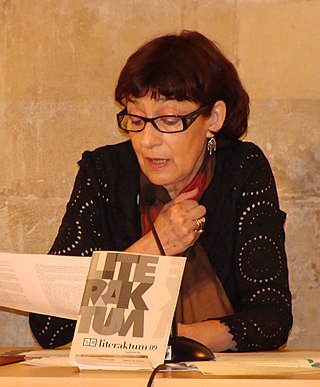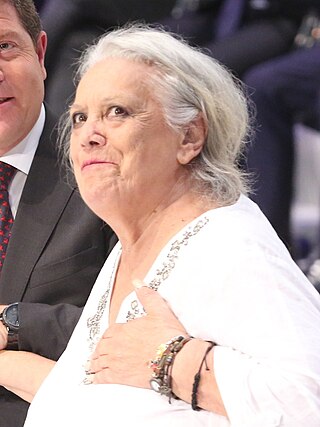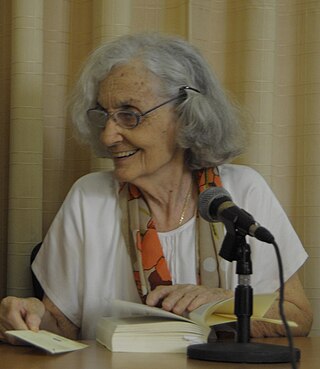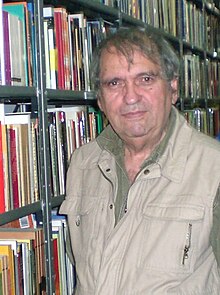
Rafael Alberti Merello was a Spanish poet, a member of the Generation of '27. He is considered one of the greatest literary figures of the so-called Silver Age of Spanish Literature, and he won numerous prizes and awards. He died aged 96. After the Spanish Civil War, he went into exile because of his Marxist beliefs. On his return to Spain after the death of Franco, he was named Hijo Predilecto de Andalucía in 1983 and Doctor Honoris Causa by the Universidad de Cádiz in 1985.
Emilio García Gómez, 1st Count of Alixares was a Spanish Arabist, literary historian and critic, whose talent as a poet enriched his many translations from Arabic.
Tomás Segovia was a Mexican author, translator and poet of Spanish origin. He was born in Valencia, Spain, and studied in France and Morocco. He went into exile to Mexico, where he taught at the Colegio de México and other universities. Segovia founded the publication Presencia (1946), was director of La Revista Mexicana de Literatura (1958–1963), formed part of the magazine Plural, and collaborated in Vuelta. He was married to the writer Inés Arredondo from 1953 to 1965.

Ida Vitale is a Uruguayan poet, translator, essayist, lecturer and literary critic.
Consuelo Hernández is a Colombian American poet, scholar, literary critic and associate professor of Latin American studies at American University since 1995.

Olvido García Valdés is a Spanish poet, essayist, translator, and professor. She is married to the poet Miguel Casado.

Luz Machado was a Venezuelan political activist, journalist and poet. She founded the Circle of Venezuelan Writers and was a member of Bolivarian Society. She is a recipient of the National Prize for Literature.
The National Prize for Literature is a literary award made annually to Venezuelan writers.
José García Nieto was a Spanish poet and writer. In 1996, he was awarded the Miguel de Cervantes Prize. Along with Gabriel Celaya, Blas de Otero and José Hierro, he was a member of the post-war generation of Spanish poets.
José Fuentes Mares National Prize for Literature is a Mexican literary award that has been presented annually since 1985 by the Universidad Autónoma de Ciudad Juárez. It is given to a Mexican author who has published a book in the form of short stories, poems or a novel. The award is named in honor of José Fuentes Mares.
Julieta Valero is a Spanish poet who writes in Spanish.

Luis García Montero is a Spanish poet and literary critic, as well as a professor of Spanish Literature at the University of Granada.

Diego Martínez Torrón is a professor of Spanish Literature at the University of Córdoba, Spain, and a writer, author of essays, poetry and novels. He has been a speaker at many of the major universities in Europe and the United States. A specialist in nineteenth and twentieth century Spanish literature he has published numerous books on Spanish Romanticism, with interpretive contributions and unpublished texts. He has edited the most faithful edition of the complete works of authors such as José de Espronceda and the Duque de Rivas. He has also written about Lista and Quintana and the work of Spanish progressive liberals from the early nineteenth century to the end of the period of Romanticism. He has studied the poetic thought of Juan Ramón, Octavio Paz and José Bergamin. He has also dedicated numerous studies to the works of Cervantes. He has studied the narrative of Álvaro Cunqueiro, Juan Benet, Azorín and has published the first annotated edition of El Ruedo Ibérico of Valle-Inclán. His concept of literary methodology stems from a new, non-Marxist approach to the binomial ideology and literature. He has edited Don Quixote, studying the thinking of Cervantes.

Teresa Marta Ruiz Penella, better known as Terele Pávez, was a Spanish actress. She appeared in more than ninety films since 1954.

Josefina García-Marruz Badía, known artistically as Fina García Marruz, was a Cuban poet and literary researcher.
Sultana Wahnón Bensusan is a Spanish essayist and literary critic, a professor at the University of Granada specializing in literary theory and comparative literature.
María Rosa Alonso was a Spanish professor, philologist, essayist from the Canary Islands.
The National Prize for Literature is awarded biennially, in odd-numbered years, by the Ministry of Education and Science, to "books in the genres of poetry, narrative, essay, or theater, written in Spanish or Guaraní, by Paraguayan or foreign authors with at least five years of residence in Paraguay." It was established in 1990 by Law No. 97/90, which also created the National Prize for Science, awarded in even-numbered years. This was updated by Law No. 1149 in 1997.
Maybell Lebron is an Argentine-born writer of short stories, poems, and novels, based in Paraguay. She is the founder of Associated Paraguayan Writers, and has won Paraguay's National Prize for Literature.

Yolanda Pantin is a Venezuelan author who has mainly written poetry, although she has also worked in children's literature.










